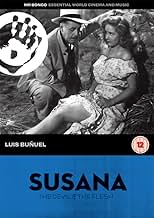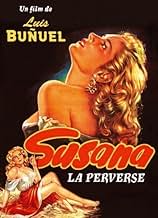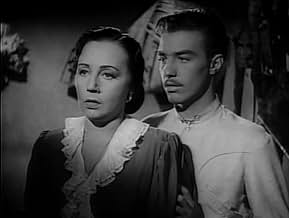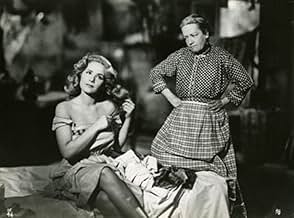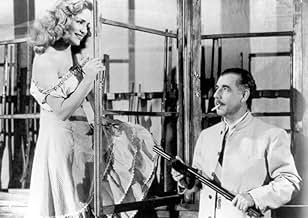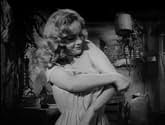Füge eine Handlung in deiner Sprache hinzuAn unstable young woman escapes from a reformatory for seriously wayward girls and deceptively finds shelter in the kind home of a frighteningly nice and decent family. Little by little, she... Alles lesenAn unstable young woman escapes from a reformatory for seriously wayward girls and deceptively finds shelter in the kind home of a frighteningly nice and decent family. Little by little, she causes unrest and discord among the members of the household until they are all fighting ... Alles lesenAn unstable young woman escapes from a reformatory for seriously wayward girls and deceptively finds shelter in the kind home of a frighteningly nice and decent family. Little by little, she causes unrest and discord among the members of the household until they are all fighting with one another.
- Auszeichnungen
- 1 Nominierung insgesamt
- Empleado de Guadalupe
- (Nicht genannt)
- Empleada de Guadalupe
- (Nicht genannt)
Empfohlene Bewertungen
She is brought into a dark and sinister cave which is teeming with rats and spiders. We know nothing about the reasons for this punishment and we can't avoid feeling sorry for her: Whatever she might have done, it does not justify an inhuman treatment such as this.
Susana is religious, and the god she calls on is kind and generous. So the miracle happens, the bars of the prison cell at which she is rattling suddenly give way and she succeeds in escaping into a night full of darkness and relentless rain.
She even can make it into paradise: A landowner's family takes her in, after she has told them a pack of lies. She is allowed to work as a maid and gains the confidence and the affection of the mother, while the father at first has a disapproving attitude towards her.
But the family's son and the steward live on the estate, too, and they don't fail to notice Susana's outstanding physical attraction. As the girl also knows how to place her charms, they both fall victim to her.
Susana, however, does not seem capable of developing any true feelings. Life is just a villainous game for her in which the rules are set by herself. The aim is to destroy the well established order. When finally even the landowner succumbs to the lure of love the initial situation becomes reversed and nothing stays the same: the mother turns into an enraged enemy, while father and son become rivals and the steward is dismissed.
It is then the latter who sets the decisive ball rolling which leads once more to a reversal of the circumstances: He finally makes use of his knowledge of Susana's escape from the reformatory, which up to now he kept to himself in order to increase his chances of winning Susana's favor, and Susana, however fiercely she may be defending herself, cannot avoid being arrested.
The game is lost, and, as it often happens in a melodrama, it is the refused lover, who makes it break down. In the end, the episode with Susana means nothing more than the memory of a nightmare for the landowner's family. And, after the re-establishment of the initial situation, the characters cannot help asking themselves if everything has really happened.
The attentive spectator will come to a different conclusion. He will notice the fundamental fragility of an order that is well established only in appearance. And he will not be able to avoid drawing a frightful parallel to his own life, in which nothing is secure and reliable either.
Susana escapes from the reformatory in which she was locked. It's a dark and stormy night. Meanwhile in a ranch nearby the members of a peaceful family follow their occupations. An old servant maid is mumbling that in nights like this the devil walks around. Thunder and lightning. Susana's face appears in the window. She faints. She is brought inside the house. Susana is a young girl with a wayward sensuality (remember, we are in 1951). Her presence will bring discord and threaten the stability of the family.
Buñuel, even in his most surrealistic films, was always deeply anchored in the reality. That is why his films are so strong. His films have a taste of earth, humanity, sensuality. "Susana" is in fact a very sensual film. The camera subtly follows Susana, her chaotic sensuality, and the other characters' reactions to her. She's the main character but not much is told about her. She was locked in a reformatory. Why? We are not told. The world doesn't accept her and her ways. Does she know what she really wants? Unfortunately it was not possible for Buñuel to give us a deeper portrait of Susana. We see her mostly through the eyes of the outside world. Why is Susana like that? What happened to Susana?
"Susana" is an over-the-top melodrama - seemingly innocent, but in the "happy ending", that seems to come out of a fairy tale, some people may detect a hidden laughter. The film was a big success in Mexico and contributed to establish definitely Buñuel as a commercially viable director.
Rosita Quintana as Susana proves her wide acting range (a shy governess in "La Ausente" and a sensual temptress in "Susana"). She's beautiful and in "Susana", she's a real volcano. Fernando Soler also distinguishes himself as the pater familias (he was also the moralist judge in "Sensualidad" and the dissolute drinking father in "Oveja Negra").
Actors and scenery are harmoniously integrated in "Susana" and Buñuel is (as always) a master of images and very adept in creating mood. Highly recommended!
Sure, it definitely pales in comparison to the desire and temptation on parade and blasting at 11 in Un Chien Andalou or Viridiana. That's because Bunuel is keeping it on the down-low, which has its advantages and sort of disadvantages. On its own Susana is simply a melodrama, a story of this girl Susana (beautiful and talented if two-note Rosita Quintana) who escapes in one of those fun Bunuelian twists from a mental asylum to wind up on a rainy night in the care of a pretty religious farmhouse. She fits in with the chores and such, but also does her best to tempt the prudish on the farm (when she's asked to cover up she does, until no one's looking relatively), but winds up in a real pickle when tempting the wrong man.
And, on its own terms, it's a pretty decent melodrama. Some good performances, a few very good scenes of dialog and tension, but also on the scale of a very good soap opera all the same. I can see where Bunuel might have had some tension during the making; it feels and is a studio production, and as such he had to stay well within the limitations of the subject matter and low-budget. But it is worth seeing because it is still a Bunuel picture, with moments like that scene at night where the two men look on, tongues practically dangling out of their mouths, watching as Susana simply brushes her hair in silhouette, or a few moments where the twisted humor ratchets up a notch or too (it's rare, but worth it, if only in the unintended or just dated "scandalous" nature of the content). It's safe stuff coming from the director of the Phantom of Liberty, but it's not at all a bad movie either.
The movie is well worthy thanks to razor-sharp performances as well as certain critical revealing the hypocrisies of modern society , in which a wayward girl uses the power of manipulation and eroticism to get her dark purports and eventually causing distresses until they are virtually struggling with each other . The picture features exceptional work by Rosita Quintana , she's magnificently charming as well as hateful playing the insidious Susana who attempts to dissect the harmonious family group . Her acting result to be a phenomenal precedent to the character who played Sue Lyon in ¨Lolita¨ or Carrol Baker in ¨Baby Doll¨ . The baddie female is really a selfish young , a manipulating babe who hates and seduces , as well as uses her feminine wiles to tempt all around . Furthermore, a beautifully cinematography in subdued black and white by José Ortiz Ramos , being shot , as usual , in Estudios Churubusco Azteca, Mexico City, Distrito Federal, Mexico. And atmospheric and appropriate musical score by Raúl Lavista.
The motion picture was competently directed by Luis Buñuel , belonging to his Mexican period and it won Ariel Awards, Mexico 1952 and Nominee Silver Ariel Best Young Actor Luis López Somoza . After shooting Spanish and French films as "Un Chien Andalou" (1929) , and ¨Age of Gold¨(1930) , ¨Hurdes tierra sin pan¨ (1936) , Buñuel went on his Mexican period in which he teamed up with producer Óscar Dancigers and after a couple of unmemorable efforts shot back to international attention with the lacerating study of Mexican street urchins in ¨Los Olvidados¨ (1950) , winning him the Best Director award at the Cannes Film Festival . But despite this new-found acclaim, Buñuel spent much of the next decade working on a variety of ultra-low-budget films, few of which made much impact outside Spanish-speaking countries , though many of them are well worth seeking out . As he went on filming "The Great Madcap" , ¨The brute¨, "Wuthering Heights", ¨El¨ , "The Criminal Life of Archibaldo De la Cruz" , ¨Robinson Crusoe¨ , ¨Death in the garden¨ and many others . And finally his second French-Spanish period , usually in collaboration with producer Serge Silberman and writer Jean-Claude Carrière with notorious as well as polemic films , such as : ¨Viridiana¨ , Tristana¨ , ¨The Discreet Charm of the Bourgeoisie" and his last picture , "That Obscure Object of Desire" . Susana rating : 7.5/10 . Essential and indispensable seeing for Luis Buñuel aficionados.
Wusstest du schon
Top-Auswahl
- How long is Susana?Powered by Alexa
Details
- Erscheinungsdatum
- Herkunftsland
- Offizieller Standort
- Sprache
- Auch bekannt als
- Susana
- Drehorte
- Produktionsfirmen
- Weitere beteiligte Unternehmen bei IMDbPro anzeigen
- Laufzeit1 Stunde 26 Minuten
- Farbe
- Seitenverhältnis
- 1.37 : 1
Zu dieser Seite beitragen


